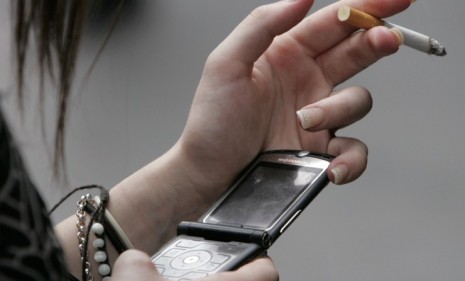Quit smoking by... texting?
Motivational messages sent to smokers' cell phones — "like a little electronic Jiminy Cricket" — could help them end their unhealthy habit for good

A free daily email with the biggest news stories of the day – and the best features from TheWeek.com
You are now subscribed
Your newsletter sign-up was successful
Can simple encouragement really motivate smokers to kick the habit? If that encouragement comes via text, then yes. Motivational text messages sent to smokers' cell phones can double their chances of giving up tobacco, a British study has found. The text messages, designed by experts with the help of smokers, provide encouragement, advice on keeping weight off while quitting, and tips on how to overcome craving. For example: "Today is the start of being QUIT forever, you can do it!" Here, a brief guide:
How did the study work?
Referred to as "text2stop," the program enrolled 2,911 smokers who were voluntarily trying to quit. Inspirational messages were sent to a randomly selected group of the participants via text. Five texts per day were sent during the first five weeks, followed by only three per week for the next six months. Participants could request messages of encouragement at "times of need" by texting the word "crave" or "lapse." The control group of smokers were sent "placebo texts," simply thanking them for participating in the study.
The Week
Escape your echo chamber. Get the facts behind the news, plus analysis from multiple perspectives.

Sign up for The Week's Free Newsletters
From our morning news briefing to a weekly Good News Newsletter, get the best of The Week delivered directly to your inbox.
From our morning news briefing to a weekly Good News Newsletter, get the best of The Week delivered directly to your inbox.
What did these text messages say?
"This is it! - QUIT DAY, throw away all your fags," read one message, using a British term for cigarette. Another said, "Think you'll put on weight when you quit? We're here to help — We'll TXT weight control and exercise tips, recipes and motivation tips." The messages worked like "a little electronic Jiminy Cricket," says Katherine Hobson at The Wall Street Journal, intended to pop up when a smoker may be needing encouragement the most.
How effective was it?
The group that received the texts were twice as likely to quit compared to those in the control group, the study, published in The Lancet, concluded. Tests of the participants' saliva for a chemical called cotinine — a byproduct of nicotine — was used to determine if the smokers really had quit. More than 10 percent of the text-message-aided smokers were still nicotine-free six months after "quit day," while only 4.9 percent of the control group were still off of cigarettes six months later. "People described txt2stop as being like having a 'friend' encouraging them or an 'angel on their shoulder'," says Dr. Caroline Free, who led the trial, as quoted by Britain's Guardian.
A free daily email with the biggest news stories of the day – and the best features from TheWeek.com
Did all of the participants respond well to the texts?
No. For some, the messages were counterproductive, as they reminded them of smoking, which triggered cravings.
Should this be the next go-to quitting plan?
As Free says, no one program will work for everyone. But the results of this study could revolutionize quitting plans. In poor countries, a program like this could be effective, as nicotine patches and other methods are too expensive and hard to come by, says Derrick Bennett and Jonathan Emberson at The Lancet. The "ubiquity" of the cell phone makes them the ideal tool for curbing smoking in these areas. "Mobile communication technology is the fastest-growing sector of the communications industry in low-income countries."
Sources: Guardian, Lancet, USA Today, Wall Street Journal
-
 Why are election experts taking Trump’s midterm threats seriously?
Why are election experts taking Trump’s midterm threats seriously?IN THE SPOTLIGHT As the president muses about polling place deployments and a centralized electoral system aimed at one-party control, lawmakers are taking this administration at its word
-
 ‘Restaurateurs have become millionaires’
‘Restaurateurs have become millionaires’Instant Opinion Opinion, comment and editorials of the day
-
 Earth is rapidly approaching a ‘hothouse’ trajectory of warming
Earth is rapidly approaching a ‘hothouse’ trajectory of warmingThe explainer It may become impossible to fix